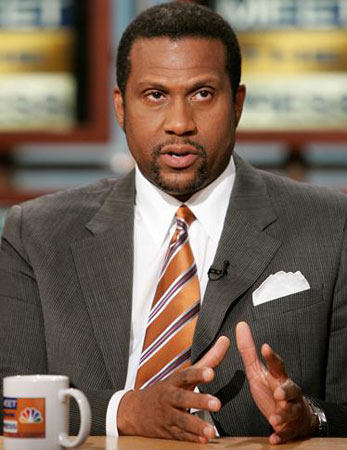Young Leaders To Younger Leaders: Change Goes Beyond Voting

Media personality Tavis Smiley addressed students at a forum
co-sponsored by his namesake foundation and USC on Friday.
Social change requires more than just rocking the vote.Â
That's the message a panel of young civic leaders stressed when addressing an audience of mostly high school and college students on the USC campus Friday.
"Just imagine if we took as much enthusiasm from the [presidential] campaign and applied it to the problems of the community," said media personality Tavis Smiley, whose namesake foundation co-hosted the event.
At its face, the message echoed the calls for youth civic engagement that rang throughout the 2008 presidential campaign. But this wasn't another lecture coming from salt-and-peppered haberdashers reflecting on their years of experience in American politics. Many of the panelists were just a few years older than the audience they were addressing.
The Young Scholars Forum, a joint effort between the Annenberg School for Communication's Johnson Communication Leadership Center and the Tavis Smiley Foundation, featured a panel of young-adult leaders that included actress Jurnee Smollett, Brown University professor Tricia Rose, and Voto Latino Executive Director Maria Teresa Petersen.
Panelists discussed the influx in youth political interest and activity during the 2008 presidential campaign, and what it would take to sustain that momentum.
Smollett, who campaigned extensively for Obama, said what she witnessed during the campaign echoed the spirit of past cultural movements at home and abroad. She related the enthusiasm behind Obama's candidacy to the sit-ins and protests that characterized political movements of the past.Â
It was like what I saw in history books," she said. "That energy sparked again during Obama's campaign."
Panelists encouraged the audience members to think about how their actions have the capacity for effecting social change - and that those actions should go beyond simply voting. Students were told to find their strengths and use them in their communities, through nonprofit organizations and campaigns.Â
"If we want to sustain a movement, we can't look to Obama to solve our problems," Petersen said. "We have to be engaged in changing our communities."Â
In an interview after the event, Los Angeles County Supervisor Mark Ridley-Thomas agreed that youth need to take the initiative to effect change, but expressed concern that voters will rely too heavily on the president to do their bidding in bringing forth a better country for them.Â
"It's a collective responsibility," he said before shifting gears to suggest that voters had already placed a lot of that responsibility on Obama's shoulders. "Blame Obama. Give it to Obama. Let him do it. He's going to fix it. He promised he would fix it. Where's Barack when you need him?"Â
Eddie Glaude, professor of religion and African American studies at Princeton University, agreed.
"One of the things we have to do is to think about where we are as a democracy. We're in deep trouble. Period. And President Obama is not Jesus, contrary to popular belief," Glaude said. "Democracy at its best is when the greatest responsibility lies on the shoulders of the greatest number. ... I know I'll get in trouble for saying this, but the moment we conflict democracy with President Obama's agenda, democracy is in trouble. Democracy is the standard by which we measure what President Obama is doing."Â
Rose, a professor of Africana studies, urged students to think beyond race-based labels and basic diversity to consider what a public figure stands for and believes.Â
"Sometimes we think that by having certain faces in high places that it will produce a shift in ideas," Rose said. "I want to encourage young people to not just hold someone biologically, ethnically accountable, but, 'What did this cat actually say?' So, it's a two-part process: what do you look like, and what are you saying."Â
Ridley-Thomas said he thinks it will take direct dialogue with young people to keep young leaders engaged in politics.Â
"[It will take] message and money," he said. "You have to speak a word that is relevant to their experience and you have to invest that resource getting to them. It's just not going to be in the ozone somewhere. It's going to have to be concretely communicated with the investment of events like this all across the country, as well as job opportunities, vocational opportunities, fixing this economy so they can feel that there's a future that is meaningful to them."



